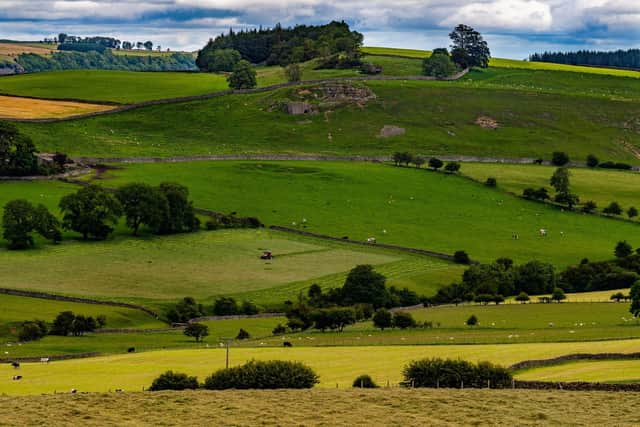Levelling up: Yorkshire's countryside should not be seen as 'rural museum'
Prime Minister Boris Johnson’s premiership has laid its foundations on the promise to pursue an agenda to level up the UK’s economy, and tackle the deeply-ingrained divide between the North and South of England.
However, leading figures in the North have voiced their concerns that the Government has not fully recognised the importance of the rural economy.
Advertisement
Hide AdAdvertisement
Hide AdData provided exclusively to The Yorkshire Post by the Northern Powerhouse Partnership, which is a leading voice of business and civic leaders across the North, has shown how towns with vast rural catchment areas are lagging behind major towns and cities.


An index has revealed that Malton, which is one of the best performing market towns in the region, has seen its Gross Value Added (GVA) per filled job rise from a score of 73.9 to 84.4 in the decade up until 2019 - although this still falls significantly short of the national average of 100.
In coastal towns such as Whitby, the GVA per filled job has fallen in the same 10-year period from 64.7 to 59.8 - a reduction of -7.6 per cent.
The director of the Northern Powerhouse Partnership, Henri Murison, said: “If we want to solve the problems of the North-South divide and regional inequalities across the country, then the whole economic picture needs to be considered.
Advertisement
Hide AdAdvertisement
Hide Ad“The countryside is very much part of the system, and has to be an integral part in the way forward with the levelling up agenda.
“A lot of the rural economy is about entrepreneurship, especially with more people considering working from home and in market towns and villages in the wake of Covid-19.
“The countryside cannot simply be seen as a rural museum that needs to be preserved, it has to adapt and evolve alongside urban areas.
“Devolution is key to this levelling up agenda, and the deal that is being planned for York and North Yorkshire could well become a template for how devolution can work for the whole country.
Advertisement
Hide AdAdvertisement
Hide Ad“It is about strengthening the major towns and cities by linking in closely with the rural areas and providing that coordinated approach which will benefit all areas of the economy.”
The long-awaited Levelling Up White Paper which was published on Wednesday last week has been trumpeted as the Government’s blueprint for bringing an economic boost that will be felt across the whole country.
However, the word “rural” is mentioned just 39 times in the 330-page White Paper, while the word “countryside” is not referred to at all in the document.
And the document outlined plans for a further report on plans to achieve levelling up in rural areas of England in the coming months.
Advertisement
Hide AdAdvertisement
Hide AdThe second report on rural proofing is due to be released in the spring to set out how government departments are working to support levelling up in countryside areas.
The Northern Powerhouse Partnership has set out a five-point plan highlighting how the vastly rural area of North Yorkshire would benefit from improved transport infrastructure and digital connectivity as well as more affordable housing and a wider acknowledgement of entrepreneurship in the countryside.
The Country Land and Business Association (CLA), which represents 28,000 farmers and rural businesses across England and Wales, has urged Ministers to embrace the rural economy to provide benefits across the whole country.
According to research by the CLA, the rural economy is 18 per cent less productive than the national average, and reducing this gap could add up to £43bn to the national economy.
Advertisement
Hide AdAdvertisement
Hide AdThe CLA also warned that people living and working in the countryside are faced with lower wages in traditional sectors such as farming and tourism while battling far higher housing costs than in urban areas.
The rural lobby group’s president, Mark Tufnell, told The Yorkshire Post: “The Government needs to ensure that the rural economy is not left behind, otherwise we will see a deepening economic divide with major towns and cities.
“We simply cannot have a fractured approach to levelling up where the countryside is seen as a separate entity from urban areas.
“There needs to be a clearly defined strategy for the whole country to make sure that urban and rural areas can both benefit from the Government’s levelling up agenda.”
Advertisement
Hide AdAdvertisement
Hide AdThe Department for Levelling Up, Housing and Communities maintained that the rural economy remains at the fore of the Government’s plans to tackle regional inequalities.
Levelling Up Secretary Michael Gove suggested this week that the issue of tackling regional inequality will now dominate political debate for the rest of the decade and potentially beyond.
A spokesperson said: “Our Levelling Up White Paper is a plan for everyone, including rural communities, who rightly expect and deserve access to better services, quicker transport and quality education.”
